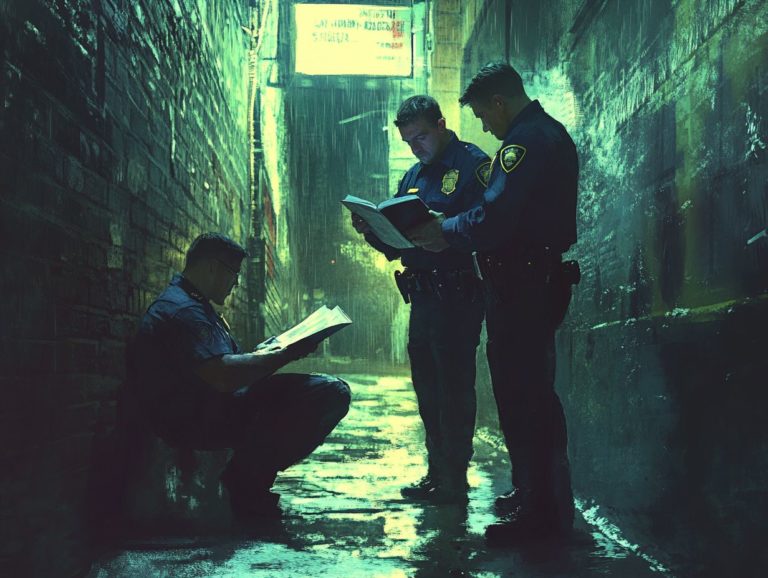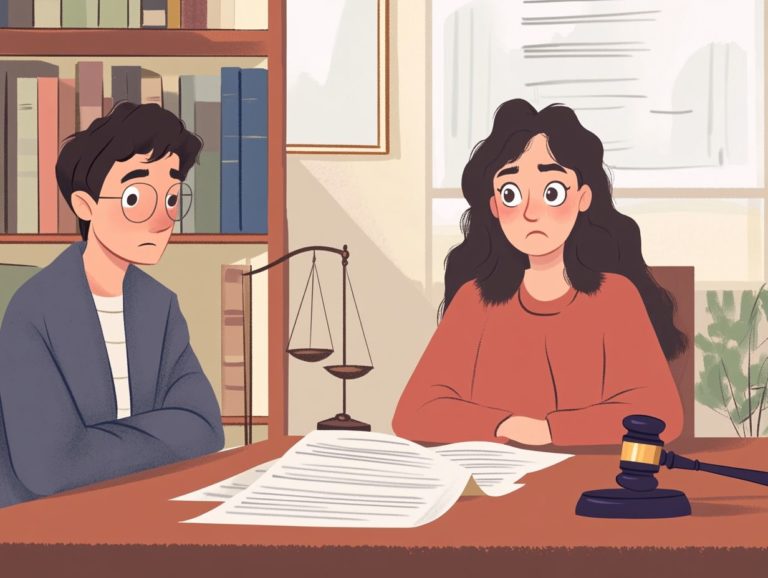Your Rights in Child Custody Cases
Child custody can be one of the most emotionally charged aspects of family law, impacting both you and your children profoundly.
Understanding custody types is crucial for navigating family law. This guide delivers vital definitions and insights.
You will find information on the legal process. Learn how to enforce custody orders if needed. Whether you re facing a custody battle or simply seeking clarity on your rights, this guide is designed to support you every step of the way.
Contents
Key Takeaways:
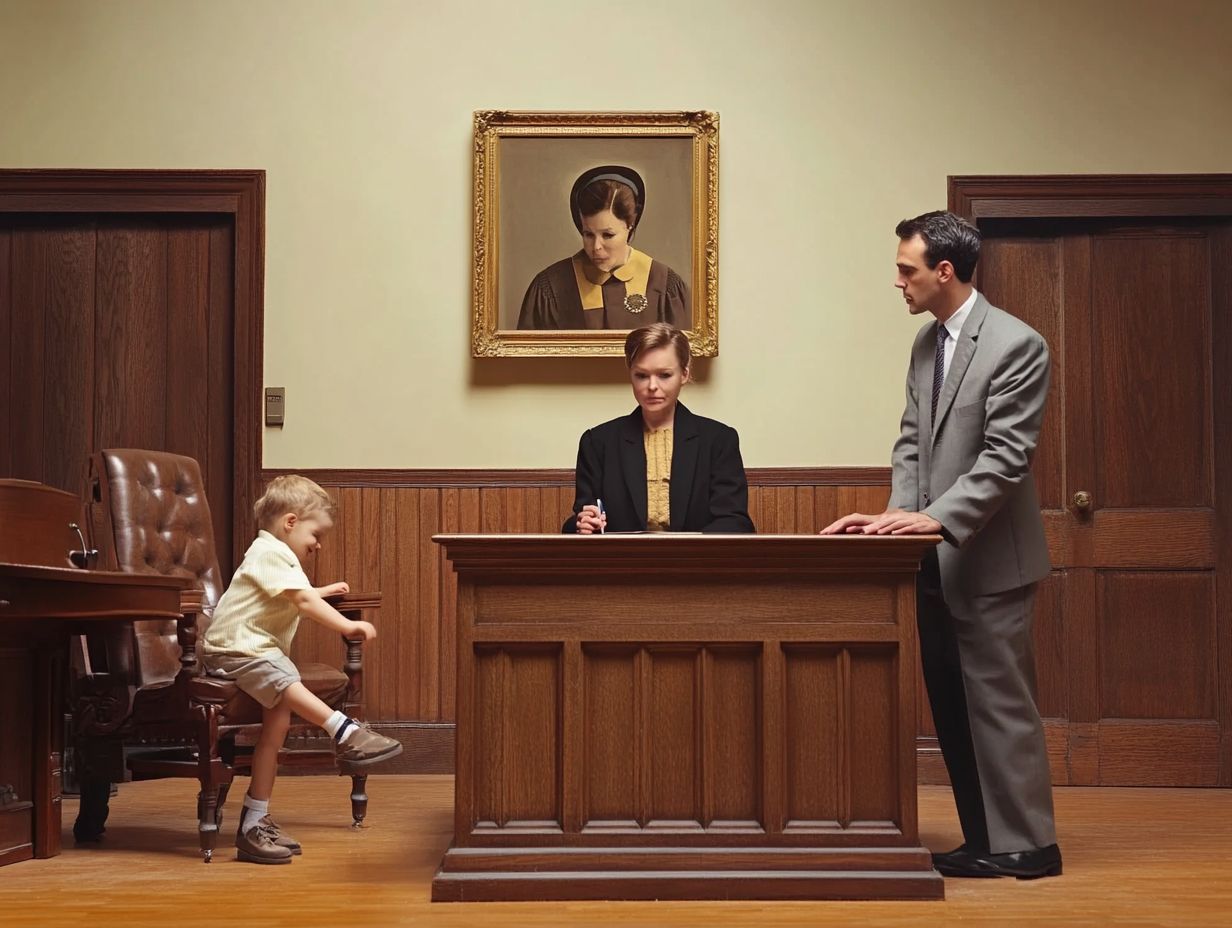
- Understand custody types to navigate the process smoothly.
- Know what factors courts consider to protect your parental rights.
- Be aware of your rights and responsibilities to achieve a fair outcome for your children.
Understanding Child Custody
Understanding child custody is essential for parents navigating the intricate landscape of family law, particularly during divorce proceedings.
Child custody involves a range of arrangements and legal definitions. Legal custody means you can make important decisions for your child. Physical custody determines where your child will reside.
You ll often need to create a parenting plan that clearly outlines visitation rights. This may include joint custody, sole custody, or supervised visitation.
At the heart of it all is the focus on your child’s best interests, ensuring their emotional and physical well-being remains a priority.
Legal Definitions and Types of Custody
Legal custody encompasses your right as a parent to make significant decisions about your child’s upbringing, including education and healthcare. Meanwhile, physical custody determines the actual residence of the child.
Grasping these two concepts is essential as you navigate custody arrangements. Legal custody can be either joint, allowing both parents to share decision-making authority, or sole, where one parent takes on that responsibility alone.
Physical custody operates similarly: in joint physical custody, children alternate their time between both parents’ homes. Sole physical custody typically means the child lives primarily with one parent, while the other enjoys visitation rights.
Understanding these distinctions is fundamental in family law. They influence not just your responsibilities as a parent but also ensure your child’s best interests remain at the forefront.
Factors Considered in Child Custody Cases
In child custody cases, the courts carefully evaluate various factors to determine what truly serves the child’s best interests. This can lead to decisions that may include joint or sole custody.
These considerations include:
- The emotional bonds between the child and parents,
- The living conditions provided by each parent,
- Any history of substance abuse or domestic violence,
- The overall emotional and psychological well-being of both the child and the parents.
To ensure every angle is assessed thoroughly, the courts frequently conduct custody evaluations, guiding the final decision with a comprehensive understanding of the situation.
What Courts Look For in Determining Custody
When determining custody, courts prioritize your child s best interest. They carefully evaluate various factors that impact their well-being and stability.
This assessment includes a close look at parental involvement. Judges scrutinize how engaged each parent is in the child’s daily life, from activities to educational support.
Living arrangements are equally significant. The court will consider whether the environment is both safe and nurturing. Your child’s emotional needs take center stage, with professionals examining how each parent can provide the necessary emotional support and stability.
Visitation rights are crafted within this framework, ensuring your child maintains a meaningful relationship with both parents while prioritizing their emotional health.
Your Rights as a Parent

As a parent, understanding your rights in custody agreements is essential. This includes legal custody, physical custody, and visitation rights.
You can influence decisions that affect your children. However, these rights can differ significantly between joint and sole custody arrangements.
Knowing your responsibilities is crucial. These agreements can profoundly impact your relationship with your children.
Rights and Responsibilities in Custody Agreements
Custody agreements outline both your rights and responsibilities. They emphasize the need to follow visitation rights and prioritize your child’s best interests.
These arrangements ensure that both parents can voice their opinions on critical decisions. This includes your child’s education, healthcare, and overall upbringing.
You also share parenting duties, which requires open communication and collaboration. This is important even if you don t live together.
With these rights come responsibilities. It’s essential to create a nurturing environment for your child.
Your role is to help maintain their emotional stability through regular visitation and a supportive co-parenting relationship.
The legal process of child custody can be complicated. It requires a good understanding of family law and mediation services.
You might collaborate with legal professionals to advocate for your rights. They will also help prioritize your children’s best interests.
Preparation is key. Know the factors influencing custody decisions and the role of mediation in resolving issues.
Steps to Take and Mistakes to Avoid
Understanding the steps in the custody process can impact the outcome. Know the common pitfalls to steer clear of.
Gather all relevant documents for your custody hearing. This includes financial records, housing details, and communication logs.
Learn legal terms to engage confidently with legal professionals. Always keep your child’s emotional well-being a priority.
Avoid miscommunication with your ex-partner. Letting emotions control your interactions can harm your credibility and affect custody decisions.
Alternative Dispute Resolution
Consider alternative dispute resolution (ADR) methods, such as mediation, to resolve custody disputes outside the courtroom.
In mediation, a neutral mediator helps facilitate discussions. This process focuses on what serves your child s best interest while minimizing conflict.
Mediation can lead to amicable solutions and improve your satisfaction with custody arrangements. This ultimately fosters healthier co-parenting relationships.
Mediation and Collaborative Law
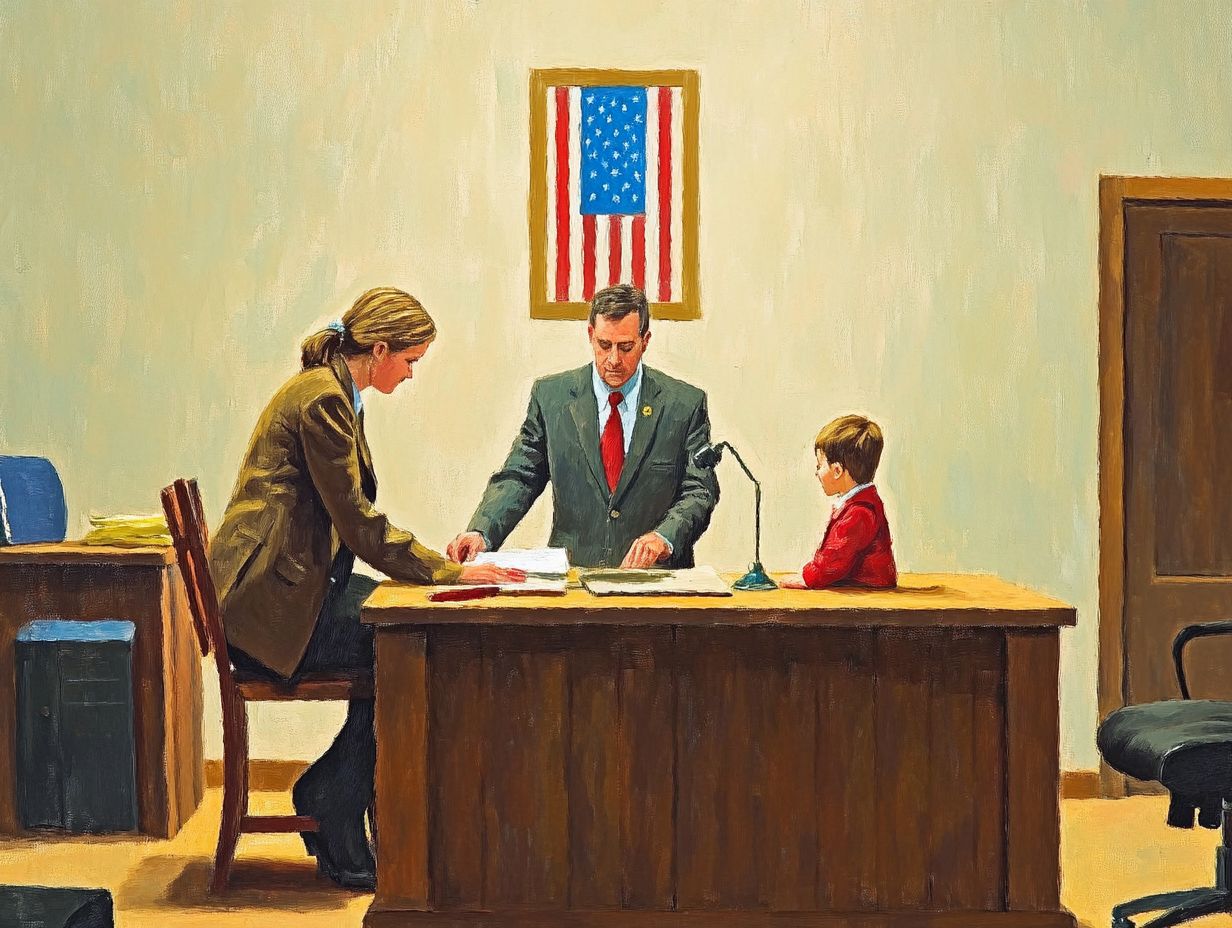
Mediation and collaborative law provide innovative pathways to navigate the complexities of child custody disputes, while protecting your rights and responsibilities. These methods prioritize open communication and problem-solving, creating an environment where you can work together to address your concerns.
Engaging in collaborative discussions gives you the opportunity to develop solutions that prioritize the best interests of your children. This approach avoids the adversarial nature of court battles. Mediators play a key role in this process; they guide conversations, ensuring that both you and the other parent feel heard and respected.
This method reduces stress and enhances the chances of reaching a mutually agreeable outcome. The legal framework surrounding these processes supports your focus on cooperative resolutions, ultimately benefiting your children by promoting stability and nurturing healthy family relationships.
Make Sure Your Custody Orders Are Followed!
Enforcing custody orders is a pivotal element of family law that safeguards visitation rights and ensures that custody agreements are honored in the child s best interest.
When one parent does not follow these orders, disputes can arise that require legal intervention. It s essential to understand your rights and the legal options available to enforce these orders while maintaining a stable environment for your children.
What to Do if Custody Orders Are Not Followed
If custody orders aren’t followed, it s crucial to understand your options for enforcement and the legal recourse available under family law.
Start by documenting any violations meticulously. Note the dates, times, and specifics of each incident. This evidence will be invaluable if you need to take legal action.
Maintaining open communication with the other parent is also essential. Calmly discussing issues can often resolve misunderstandings before they escalate into larger conflicts.
If those conversations don t yield results, it may be time to seek legal assistance to navigate the complexities of family law. Not following the rules can result in serious consequences, including potential changes to custody arrangements.
Prioritizing your child’s well-being and stability throughout this challenging process is crucial.
Frequently Asked Questions
What Are My Rights in Child Custody Cases?
Your rights in child custody cases include the right to request custody of your child, be involved in important decision-making regarding your child’s upbringing, and have regular visitation or parenting time with your child.
Can I Request Sole Custody of My Child?
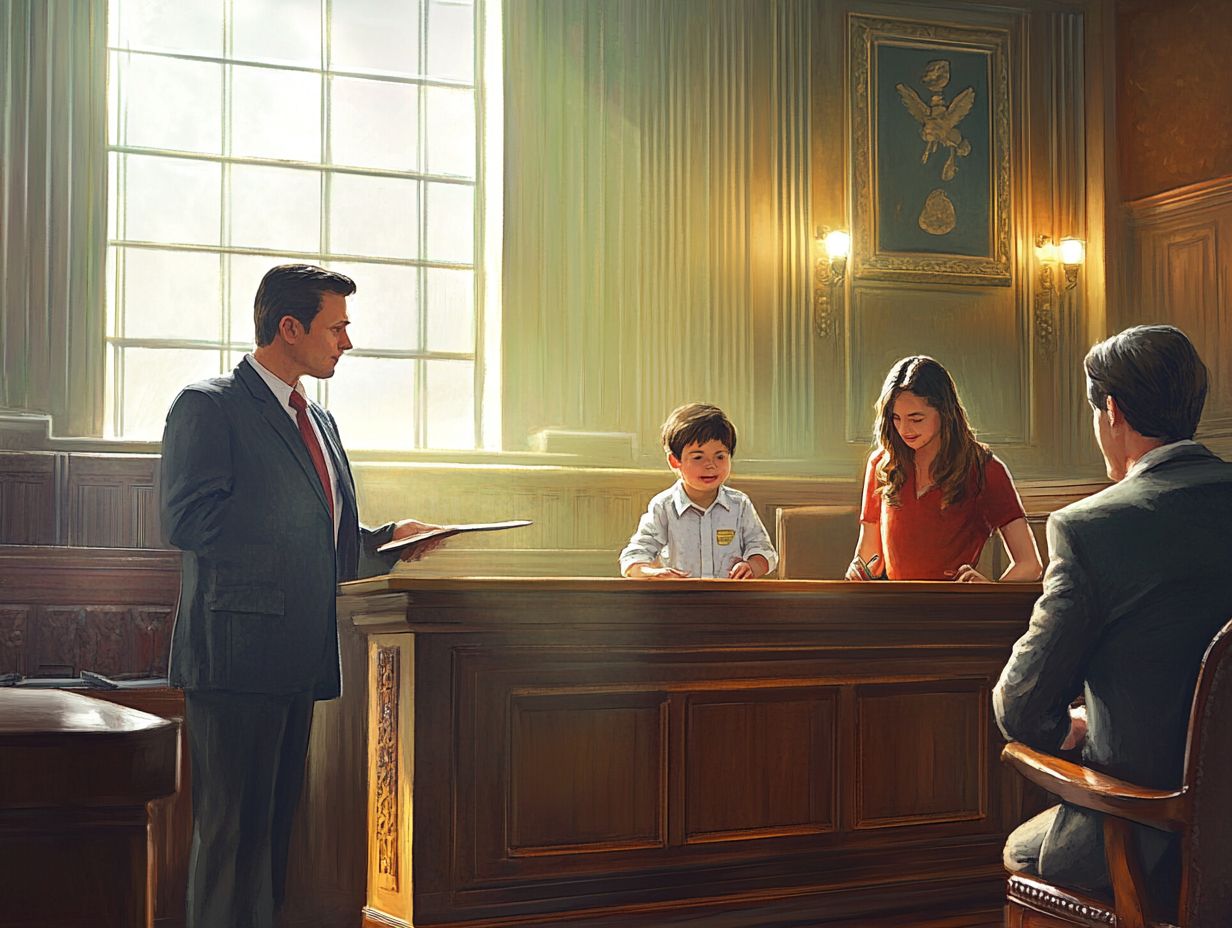
Yes, you have the right to request sole custody of your child if you believe it is in their best interest. However, the court will consider various factors before making a decision and may grant joint custody or visitation rights to the other parent.
What Happens if the Other Parent Violates My Custody Rights?
If the other parent violates your custody rights, you have the right to take legal action. This may include filing a motion for contempt or requesting a modification of the custody order. The court may also impose penalties on the parent not following the rules.
Do Grandparents Have Any Rights in Child Custody Cases?
In some cases, grandparents may have the right to request visitation or even custody of their grandchild. However, this will depend on the specific circumstances and the laws of your state.
Can I Modify My Custody Agreement?
Yes, you have the right to request a modification of your custody agreement if there has been a significant change in circumstances since the original agreement was made. This may include a change in the child’s needs or relocation of one parent.
Do I Need a Lawyer to Protect My Rights in Child Custody Cases?
While it is not required, it is highly recommended to seek the advice and representation of a family law attorney in child custody cases. They can help you understand your rights, navigate the legal process, and increase your chances of achieving a favorable outcome.



